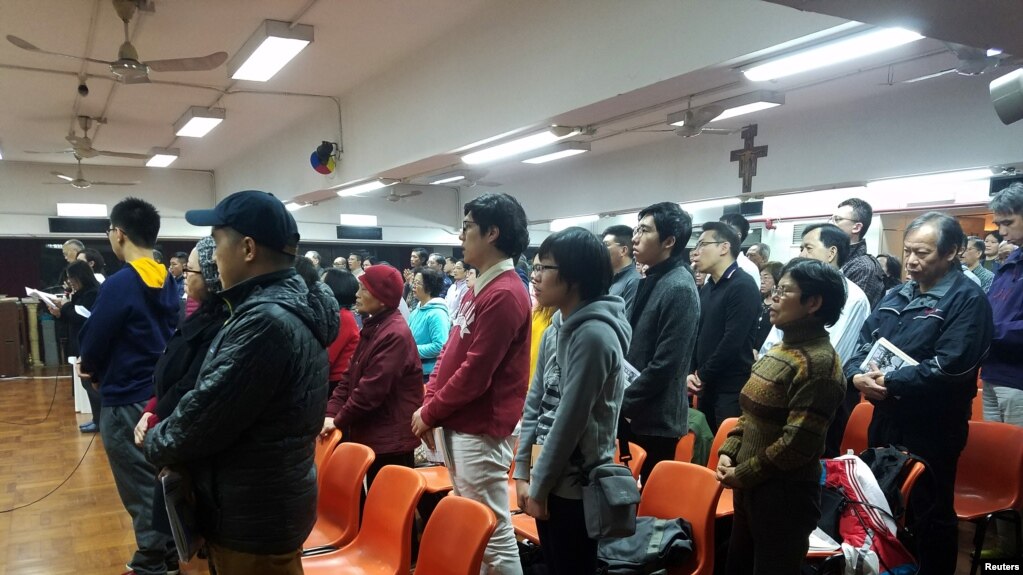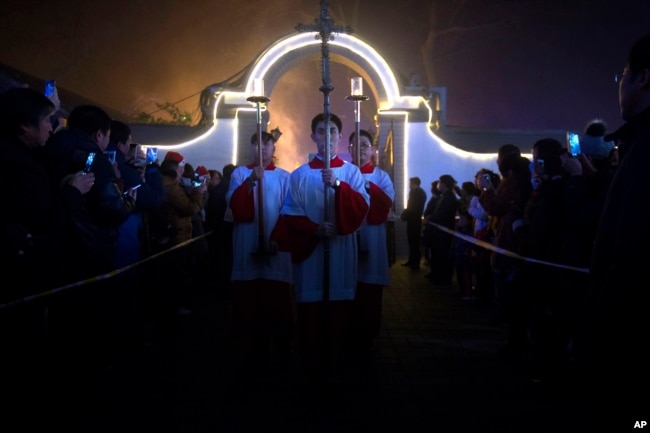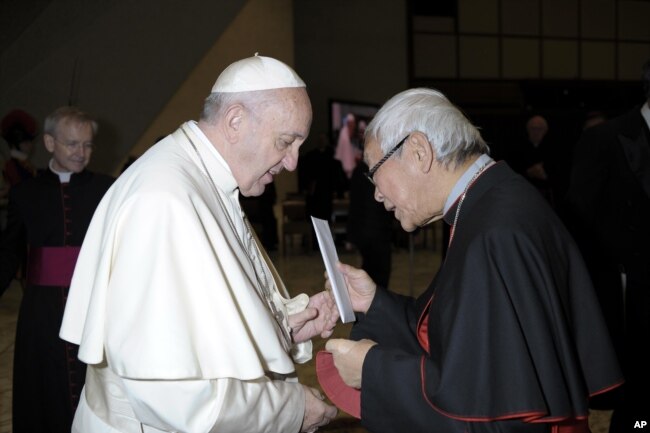By Suzanne Sataline

About 200 Catholics attend a prayer meeting for the Chinese Church after news emerge that Beijing and the Vatican have reached a deal on bishop appointments, in Hong Kong, China, Feb. 12, 2018.
HONG KONG — At a recent all-night prayer vigil, nearly 100 Roman Catholics gathered in a church ground floor chapel to pray the rosary in Cantonese for their fellow worshippers in mainland China.
On their minds as they recited the prayer: a possible deal between the Holy See and China's communist leaders that is worrying many Catholics.
Lucia Kwok, a care worker stepped out of the chapel and spoke of her dismay over the recent news. Francis, she said, was making deals with the government in China.
HONG KONG — At a recent all-night prayer vigil, nearly 100 Roman Catholics gathered in a church ground floor chapel to pray the rosary in Cantonese for their fellow worshippers in mainland China.
On their minds as they recited the prayer: a possible deal between the Holy See and China's communist leaders that is worrying many Catholics.
Lucia Kwok, a care worker stepped out of the chapel and spoke of her dismay over the recent news. Francis, she said, was making deals with the government in China.
“We don’t trust the PRC because they are dishonest. They lie, they do bad things and never keep their promises,” Kwok said.
“China is not worth our trust.”
Many Catholics in Hong Kong are confused and upset with the Vatican’s recent steps to resume relations with the Chinese government even as Beijing has continued to silence critics.
In the nearly seven decades since its establishment, the People's Republic of China has not had formal diplomatic relations with the Holy See, a condition rooted in the Vatican's tradition of appointing its bishops worldwide — a practice the mainland Chinese leadership has historically viewed as interference in its internal affairs.

Many Catholics in Hong Kong are confused and upset with the Vatican’s recent steps to resume relations with the Chinese government even as Beijing has continued to silence critics.
In the nearly seven decades since its establishment, the People's Republic of China has not had formal diplomatic relations with the Holy See, a condition rooted in the Vatican's tradition of appointing its bishops worldwide — a practice the mainland Chinese leadership has historically viewed as interference in its internal affairs.

Cross-bearers process through the church grounds during a Christmas Eve mass at the Southern Cathedral, an officially-sanctioned Catholic church in Beijing, Dec. 24, 2015.
Patriotic Catholic Association
China's Catholics have been allowed to practice their religion under a government-supervised entity known as the Patriotic Catholic Association in which the government officially names bishops.
Patriotic Catholic Association
China's Catholics have been allowed to practice their religion under a government-supervised entity known as the Patriotic Catholic Association in which the government officially names bishops.
Some — but not all — of those bishops have been quietly approved by the Vatican as well.
The Holy See has considered sacraments administered in the patriotic church valid, but the existence of the entity and the government's tight control of it has for decades has prompted many observant Catholics to practice their faith in a parallel, "underground" Catholic church, whose members see themselves as true followers of the church in Rome.
The Holy See has considered sacraments administered in the patriotic church valid, but the existence of the entity and the government's tight control of it has for decades has prompted many observant Catholics to practice their faith in a parallel, "underground" Catholic church, whose members see themselves as true followers of the church in Rome.
The underground church is declared illegal and its members have been routinely subjected to arrest and ruthless persecution.
 Believers take part in a weekend mass at an underground Catholic church in Tianjin.
Believers take part in a weekend mass at an underground Catholic church in Tianjin.
An agreement between the Holy See and the Chinese government would allow the Vatican to operate more openly in China, but grant greater control to Beijing over the church's decisions.
Zen expresses frustration
At the prayer gathering in Hong Kong, Kwok’s frustration was echoed by Cardinal Joseph Zen, the retired bishop of Hong Kong and a longtime critic of Beijing, who prayed quietly with the group.
 Believers take part in a weekend mass at an underground Catholic church in Tianjin.
Believers take part in a weekend mass at an underground Catholic church in Tianjin.An agreement between the Holy See and the Chinese government would allow the Vatican to operate more openly in China, but grant greater control to Beijing over the church's decisions.
Zen expresses frustration
At the prayer gathering in Hong Kong, Kwok’s frustration was echoed by Cardinal Joseph Zen, the retired bishop of Hong Kong and a longtime critic of Beijing, who prayed quietly with the group.
In recent weeks he has termed any agreement between the Vatican and Beijing that would allow China control over the church as “evil.”
 Retired archbishop of Hong Kong Cardinal Joseph Zen gestures during an interview in Hong Kong, Friday, Feb. 9, 2018.
Retired archbishop of Hong Kong Cardinal Joseph Zen gestures during an interview in Hong Kong, Friday, Feb. 9, 2018.
News reports have said the agreement would legitimize the government-appointed bishops and force those in the underground church to retire.
 Retired archbishop of Hong Kong Cardinal Joseph Zen gestures during an interview in Hong Kong, Friday, Feb. 9, 2018.
Retired archbishop of Hong Kong Cardinal Joseph Zen gestures during an interview in Hong Kong, Friday, Feb. 9, 2018.News reports have said the agreement would legitimize the government-appointed bishops and force those in the underground church to retire.
The reports say the pope in Rome would have a final say over the approval of bishops, but Zen has voiced concern that Beijing would only name bishops loyal to the communist leadership.
 In this Jan. 10, 2018 photo made available the Vatican newspaper L'Osservatore Romano, retired archbishop of Hong Kong Cardinal Joseph Zen hands a letter to Francis at the end of his weekly general audience.
In this Jan. 10, 2018 photo made available the Vatican newspaper L'Osservatore Romano, retired archbishop of Hong Kong Cardinal Joseph Zen hands a letter to Francis at the end of his weekly general audience.
“It’s something important for the whole church, this attitude of fidelity and disrespect for our faith. The faith and the discipline. It’s a very serious matter to disregard centuries of doctrine,” Zen said. “They want everybody to come into the open and obey the government. They never say how they would deal with bishops in the underground. It’s obvious what they are going to do… They will not only eliminate bishops, but in some dioceses have no bishop, but some kind of [government] delegate.”
The Vatican has asked Catholics for time to work out details.
 In this Jan. 10, 2018 photo made available the Vatican newspaper L'Osservatore Romano, retired archbishop of Hong Kong Cardinal Joseph Zen hands a letter to Francis at the end of his weekly general audience.
In this Jan. 10, 2018 photo made available the Vatican newspaper L'Osservatore Romano, retired archbishop of Hong Kong Cardinal Joseph Zen hands a letter to Francis at the end of his weekly general audience.“It’s something important for the whole church, this attitude of fidelity and disrespect for our faith. The faith and the discipline. It’s a very serious matter to disregard centuries of doctrine,” Zen said. “They want everybody to come into the open and obey the government. They never say how they would deal with bishops in the underground. It’s obvious what they are going to do… They will not only eliminate bishops, but in some dioceses have no bishop, but some kind of [government] delegate.”
The Vatican has asked Catholics for time to work out details.
Francis, speaking to reporters in early December, said: “It’s mostly political dialogue for the Chinese Church… which must go step by step delicately,” he said.
“Patience is needed.”
Changing political landscape
Several Catholics in Hong Kong have said the move can be seen as an appeasement, coming at a fraught moment when China has grown more authoritarian under Xi Jinping.
On Sunday, China’s ruling party announced it would end presidential term limits, an extraordinary move by a government that sought to avoid the dangerous one-man control exerted by former leader Mao Zedong.
Changing political landscape
Several Catholics in Hong Kong have said the move can be seen as an appeasement, coming at a fraught moment when China has grown more authoritarian under Xi Jinping.
On Sunday, China’s ruling party announced it would end presidential term limits, an extraordinary move by a government that sought to avoid the dangerous one-man control exerted by former leader Mao Zedong.
The move will, in effect, allow Xi to serve for life.
During his five years in office, Xi’s policies have attacked economic corruption as well as curtailed the work of human rights attorneys, labor organizers, investigative journalists and bloggers.
In December, the Vatican asked two bishops in the underground church in China to relinquish their roles to men approved by the government.
In December, the Vatican asked two bishops in the underground church in China to relinquish their roles to men approved by the government.
Vatican envoys asked Bishop Zhuang Jianjian of Shantou to step down and cede control to Huang Bingzhang, an excommunicated bishop and a member of China’s acquiescent legislature, the National People’s Congress, according to asianews.it.
Guo Xijin, another underground bishop in Fujian province, was asked to serve as an assistant to Zhan Silu, another government appointed bishop.
Guo Xijin, another underground bishop in Fujian province, was asked to serve as an assistant to Zhan Silu, another government appointed bishop.
Previously, the Vatican had said that both men had been elevated illegally by the government.
Opponents see it as an unusual intrusion, even violation, of the church’s authority.
Opponents see it as an unusual intrusion, even violation, of the church’s authority.
They are also concerned about signs that the government has restricted religious practice, such as orders that followers not bring children to worship.
News of the Vatican’s negotiations prompted several professors to start a petition against any agreement that would cede control to Beijing.
News of the Vatican’s negotiations prompted several professors to start a petition against any agreement that would cede control to Beijing.
More than 2,000 people have signed.
“We think the Catholic Church has appeal [for] the Chinese people exactly because it has refused to compromise with the Chinese authority,” said Joseph Cheng Yu-shek, a retired political science professor in Hong Kong, and one of the petitions organizers.
“We think the Catholic Church has appeal [for] the Chinese people exactly because it has refused to compromise with the Chinese authority,” said Joseph Cheng Yu-shek, a retired political science professor in Hong Kong, and one of the petitions organizers.
“The first Christians of China were the very, very poor peasants in the cultural revolution days. My argument is if the Vatican makes a compromise with Beijing, the Catholic church loses that moral and spiritual appeal. And it doesn’t benefit the church.”
Aucun commentaire:
Enregistrer un commentaire